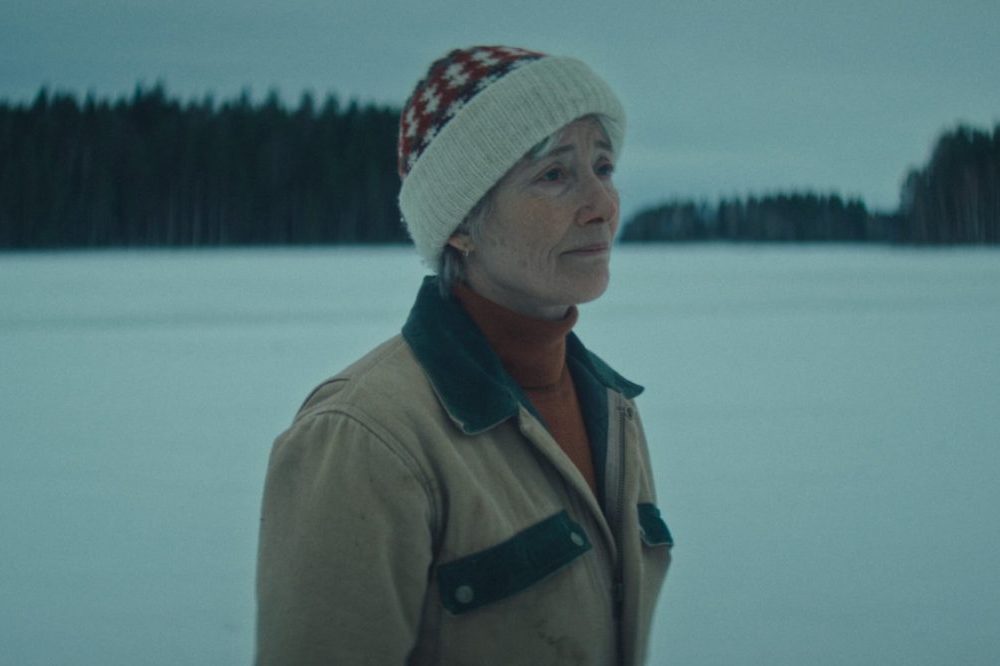Dead of Winter is a thriller starring Emma Thompson as a woman traveling to a remote lake in Minnesota to go ice fishing, when she stumbles upon a pair of kidnappers who are holding a young woman hostage for some mysterious purpose. So in other words, it has almost nothing to do with the Paddington movies.
A more obvious comparison would be to Barbarian. Dead of Winter doesn’t have anything like that movie’s sense of humor, but both are centered around a normal woman who’s pulled into a horrific situation because she chooses to do the right thing.
But the most affecting scene for me in Dead of Winter involved the same thing as the most affecting scenes in Paddington: a moving act of kindness from an unexpected source.
The motivation here isn’t nearly as noble or selfless. Characters in this movie are largely driven by desperation. But throughout the movie, we’ve seen flashbacks to main character Barb’s past (in which she’s played by Thompson’s real-life daughter Gaia Wise) that gradually reveal why she’s chosen to come to this lake in the middle of nowhere during whiteout conditions. And we’ve seen her desperate search for something of extreme sentimental value, and if you’re like me, we’ve wondered why she’d devote so much time to the search while in the middle of a tense life-or-death situation. So the unexpected payoff of all that was extremely affecting.
There’s an awful lot to like about Dead of Winter. I’d heard reviews say it was kind of a “Fargo-lite,” with most reviews praising Thompson’s performance and describing her as going “full Marge Gunderson” with her accent. I don’t think that’s the case at all; they do kind of overdo the “sore-y” but overall, this movie is a lot more grounded than Fargo, and it doesn’t get nearly as much mileage out of playing with the idea of “Minnesota Nice” confronted with selfishness and evil.
The screenplay does a particularly good job with exposition. The details of the story take the entire running time to completely unfold, to learn exactly what’s motivating each of the characters and why they’re in this situation, and it’s all delivered naturally. The audience is invited to make the connections themselves, and the story feels much larger as a result.
I was really impressed with most of it. It was a solid, self-contained, realistically-scaled thriller that respected the audience’s intelligence and told its story well. And then the ending came along, which knocked it back down a few pegs. It’s not horrible, and it doesn’t come completely out of left field. But it did feel kind of sloppy for a story that had otherwise felt so tightly and confidently delivered. It felt as if stuff started happening because it was a movie, more than because it fit the story.
I liked that it was left a little ambiguous what the theme of the movie was intended to be, assuming there was the intention of a theme beyond “a tight thriller about a Minnesotan woman versus kidnappers.” Throughout, Barb fights back against villains who are more ruthless and much more heavily-armed not by becoming a super-hero, but by being clever. And she delivers a pretty lengthy monologue at one point — the kind of monologue that seems specifically written to appeal to actors like Thompson — that’s all about how her great-grandfather survived a deadly blizzard by pushing forward and refusing to give up.
You might then conclude that it’s about the strength and resilience of “normal” women who refuse to give up. But Judy Greer’s character is also an example of a woman who refuses to give up in the face of adversity. And without spoiling anything, I’ll say that she’s clearly not intended to be a role model.
So I think that the more significant theme of resilience is about refusing to give up our values of kindness and compassion, insisting on helping people who need our help even when it feels like we’re powerless to do anything. It implicitly asks the question why are we so bent on survival? Why do we cling to life and keep relentlessly pushing forward? And it offers the simple answer: we’re here for each other.
